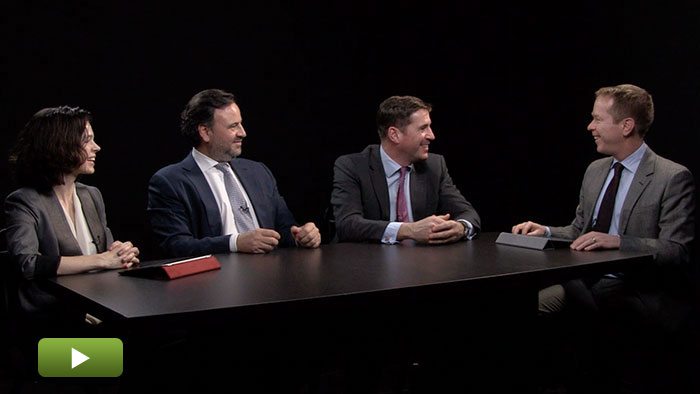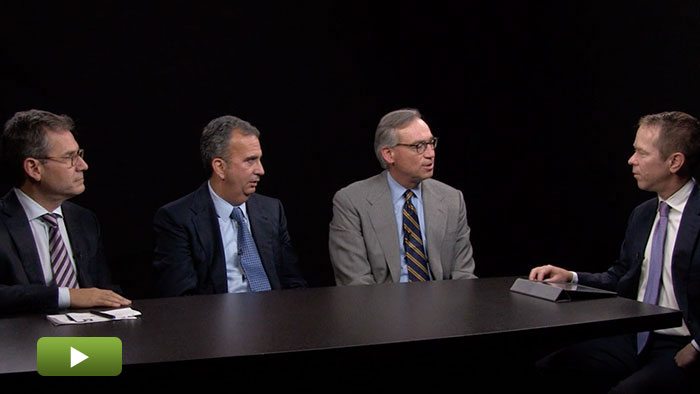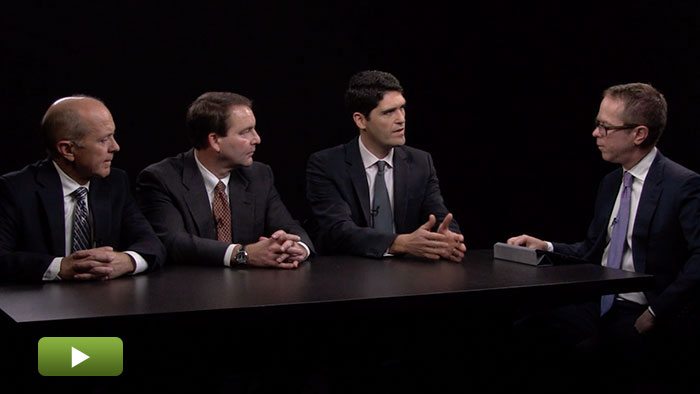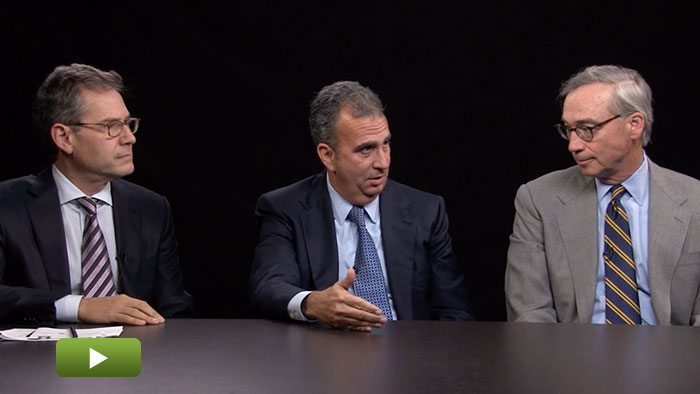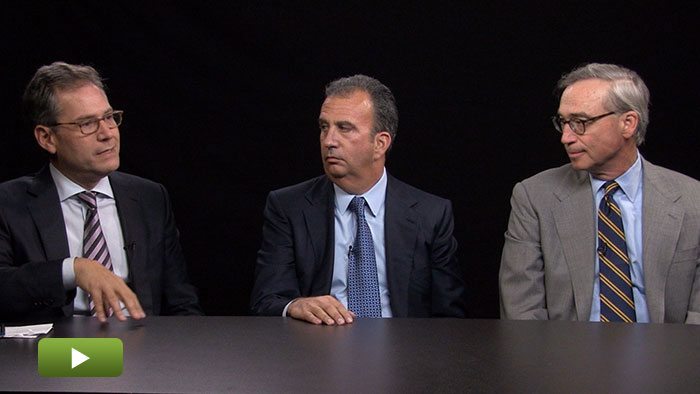Fact: Fundraising Isn’t Easy
In the second of four videos exploring facts that could change the way the PE industry is viewed, experts from W Capital Partners, Gen II, and BlackRock discuss why fundraising isn’t easy and perhaps never has been. They also discuss why that’s a good thing, and why the importance of due diligence has increased.
Transcript Download Transcript
Fact: Fundraising Isn’t Easy
Four Facts Illuminating PE’s Future
David Snow, Privcap: Today we’re joined by David Wachter of W. Capital Partners, Steven Millner of Gen II Fund Services, and Russ Steenberg of BlackRock Private Equity Partners. Gentlemen, welcome to PrivCap today. Thanks for being here.
I have a fact that I’m going to read out, and then I’d love to hear your perspectives on it. The fact is that only 26 percent of fundraisings are both reaching their targets and happening within a year, so possibly being described as easy fundraisings, although perhaps that term doesn’t really exist. So that means that 74 percent of all fundraisings are often protracted and often end in disappointment. So I guess first question for you, Russ: Is this the new normal? Is fundraising simply going to take a long time and be painful?
Russ Steenberg, BlackRock Private Equity Partners: Well, first thing is, fundraising is never easy. Second thing is, I’m not sure your benchmark for determining success for fundraising is the appropriate one. And in the third—to answer your question, is it a new normal?—it comes back to something you and I’ve talked about many times, David. It comes back to the cycle.
This part of the cycle that we’re in right now, if you have a fund that has been able to survive with its assets through the downturn, who has been able to provide very good distributions to its limited partners, who has a very good focus strategy that’s proven time in, time out, that they can create value for their limited partners—they will raise their money, depending upon what’s going on with their limited-partner base, because it’s always shifting, depending upon what’s going on in capital markets and what the liability stream is.
So as a result, whether it takes them a year or 16 months or 18 months to raise their money—and a lot of that depends upon how much money they’re trying to raise—they will raise it and be successful. Those folks that haven’t met the kind of criteria I’ve laid out, they will struggle.
Snow: Steve, as someone who spends a lot of time with private equity firms as sort of separate business entities, have you seen the strain on organizations as they try to go out and fundraise, and maybe they’re not prepared for the infrastructure challenges they might face in a protracted fundraising?
Millner: What’s really happened over the last couple of years is—especially, post-Madoff, plus regulation, plus a much smarter and better-educated limited partner—you’ve got a much bigger focus on operational due diligence, as well as investor due diligence. And that’s something that we’ve seen change. So historically, as a fund administrator, we wouldn’t get hired until the folks are pretty close to raising the money.
In the past two years or so, we’re getting hired way before they’re even meeting their first LP. The general partner and the sponsor want to have all their ducks in a row. And be prepared to check the box when the LP comes in—and that’s a new phenomenon. The other thing that’s happened is, as you cited, there’s some uncertainty as to what the size of the business is going to be, what the revenue model,—i.e., the management fee—is going to look like, and how do they staff this thing? So firms like us do a very good job of being elastic and giving the fund sponsors optionality, in terms of how they think about staffing the business. So a lot has changed over the last ten years.
Steenberg: One of the changes, which you certainly know, Steve, is a limited partner with their assault and their due diligence of a fund better do their due diligence in the back office on the operation side of it. And I think that is a direct result of the Madoff situation.
Steven Millner, Gen II Fund Services: Yeah, I mean I can tell you, again, we have a very nice conference room in our office, and we only really expected to use it when we were pitching our clients. But increasingly LP’s are coming in. They want to take a site tour. They want to look around. They want to look at business continuity and disaster-recovery plans and all that—you know, those controls and processes that go along. And that is a fairly new phenomenon for us.
Snow: David Wachter, you spend a lot of time with GPs, talking to them about their portfolios, especially the legacy items and their portfolios. Russ mentioned the need to get capital back to investors. Are the legacy portfolio companies that many of these GPs still hold hampering future fundraising efforts?
David Wachter, W Capital Partners: Yes and no. Clearly, harvesting a portfolio for everybody is taking longer. The tricky part is fair valuation of portfolio companies. I mean, both GPs and LPs understand that that is a challenge. And there is a lot of art in it and very little science, so assessing unrealized portfolios for an LP is really, really challenging. So the idea that you can get the ball of realizations far enough down the road that an LP can feel more and more comfortable that the track record and performance are valid is just really, really important.
Snow: At what point will the private equity fundraising market become more efficient? It seems like it’s getting more painful, it’s getting more protracted. Don’t we have things like technology and best practices that can change things a bit and match buyer with seller in a more efficient manner than people flying on airplanes around the world and spending five hours in your conference room looking at documents?
Millner: Well, you know, technology’s come a long way, and we’re, in part, a technology shop. But I’ll tell you, I think, candidly, in most asset classes, this is really about the people running the assets. And there’s no substitution for spending time with mangers, understanding their culture, making sure there’s an alignment of interest. And technology is a complement to that, but is not primary. So I think we’re in this type of process where it’s largely one to one. I don’t see that changing anytime soon.
Steenberg: Why would those of us in the private equity world want to make it a more efficient process? Because the more efficient it becomes, the more at risk my whole business becomes.
Snow: Well, I guess, from a GP’s perspective, what they would like is to get a quicker no or a quicker yes, as opposed to sort of flying around the world and having meeting after meeting after meeting.
Steenberg: Quick no’s and quick yes’s are something GPs love. You’re correct about that.
Snow: Yeah. Yeah.
Wachter: But there’s an ancillary benefit. It goes even, you know, we all be known candidly, all the costs associated with regulation. But guess what? It’s actually created a barrier of entry, so that…
Steenberg: Oh, sure. Always does.
Wachter: …two guys can’t just pop up and rent some office space and say, “We’re in the PE business.” So there’s actually been a constructive side of it. Once you’re over the line and you’re in the club, not a bad place to be.
Snow: It sounds like most of you believe that private equity fundraising has always been pretty hard, will continue to be hard for the foreseeable future, and probably should be that way because we don’t want yahoos getting into private equity the easy way.
Steenberg: The marginal dollar messes up a good game.
Millner: The one thing though, David, that we’ve seen a little different—and I think my colleagues might have as well—in the last couple of years: The notion of bringing a cornerstone investment has become a fairly increasing way to raise money. So if you want to raise a billion-dollar fund, we’re oftentimes seeing a billion dollars, but there could be one strategic investor coming in for several hundred million dollars.
They like to come in on the first close. They might get some economics in the sponsor. It gets the sponsor in business, it legitimizes the sponsor, and it’s a new way to raise money, and I think it actually accelerates the time frame to raise money. And it’s something I think you’re going to see more and more of, as time goes by.




